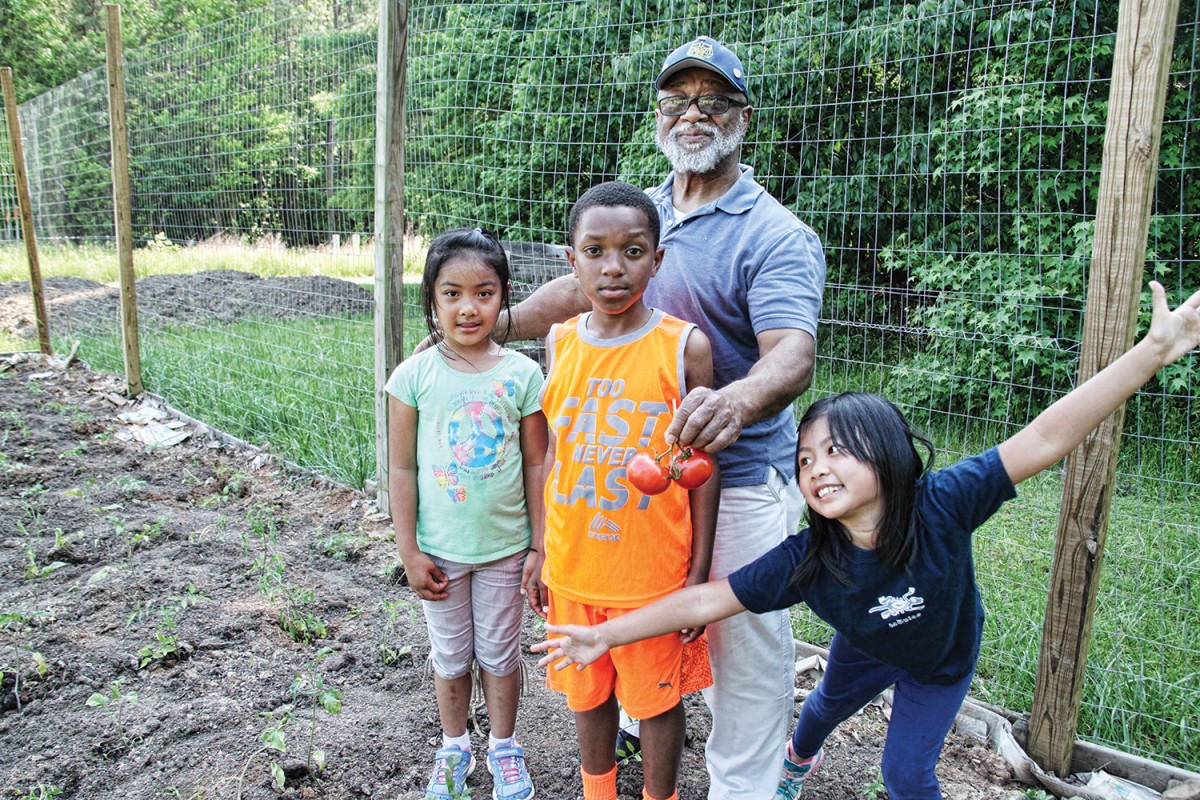At His Table
Posted on July 15, 2016Food and community are one for the Rev. Robert Campbell.

The Rev. Robert Campbell uses the Rogers Road community garden to teach neighborhood children about nutrition, field-to-table and the math behind growing and preparing food. Photo by Mike Benson
The Rev. Robert Campbell made his living cooking in Chapel Hill restaurants — Lucy’s, Sambo’s, Henderson Street Bar & Grill. He ran the kitchens at Carolina Grill, Shoney’s and the Chapel Hill Country Club.
For seven years, you could find him at the Pi Kappa Alpha house, cooking for the brothers, singing with their house band, inspiring them to get involved with nagging issues in his part of town — the part that looks nothing like the fraternity courts.
The food, in fact, is the last thing that reminds Sam Ridderhof ’12 of his days at PIKA with Campbell: “An enormous generosity of spirit,” he says. “He put so much on his back to make sure the voice of his community was heard.”
Now Campbell is chapter president of the Orange County NAACP, having spent his life bringing diverse groups of people to the table to help him fight for those whose voices often are ignored. One’s lot in life, like a recipe, he believes, can be improved.
In Chapel Hill, “Rogers Road” is a metaphor for marginalized. About five miles north of the busiest areas of Franklin Street, the historically black neighborhood encompasses land once worked by slaves — now seven neighborhoods housing some 300 families, a community of African-Americans, of Hispanic and Burmese immigrants who fled dismal futures. And the landfill that opened in 1972 — the same year Campbell returned to town after his Navy service — and began making life miserable for Rogers Road residents. The town and county finally closed it two years ago.
“Landfills go to communities of color, to groups with low income and low education,” Campbell says. “And they suffer.”
“He is indefatigable,” said Mark Dorosin ’94 (JD), managing attorney for the UNC Center for Civil Rights and an Orange County commissioner. “He was fighting to move the landfill, to stop the waste-transfer station, to get water and sewer linking to make the water safe, to get bus service.”
That struggle has defined Campbell’s adult life, put him on a journey that took him out of the PIKA kitchen and into lawyers’ offices and labs at UNC’s Gillings School of Global Public Health. It took him all the way to a podium in the White House, where in 2009 his story sparked a national conversation about the implications of where communities put their trash.
Food, fight
The Campbell family men were construction workers, plumbers and brick masons who taught their skills to their sons. Young Robert Campbell also was influenced by a group of aunts, all of them gifted cooks. Aunt Louise had a long career in food service, and she often took him along, letting him carry the heavy flour sacks. Aunt Cellie owned the Thomas Cut Rate Market on Merritt Mill Road, where after school, Campbell and his brothers helped out. His cousin Mildred is known to most as “Mama Dip,” proprietor of one of the town’s signature restaurants.
Food and work always went together, but it was the cooking, eating and talking on Sundays that formed Campbell’s ideas of how to live. After church, everyone gathered at his grandmother’s house, adults and as many as 25 children packing the tables.
“We’d start off and test food and talk about how to improve it,” he recalled. “Fried chicken, biscuits so light you needed a toothpick and string to pin them to the plate. We’d eat and talk and debate how to improve a recipe. That’s how we enjoyed the day.”
When he came back from Vietnam, he got a job cooking and started taking classes in business administration at Durham Technical College. Meanwhile, the landfill closing deadline was extended time and again, while residents waited for basic water and sewer services. Campbell and his best friend, David Caldwell Jr., began organizing neighbors. In 2007, Campbell filed a complaint with the Environmental Protection Agency’s Office of Civil Rights. In 2009, he reached out to the Gillings school to have the neighborhood water tested; evidence of fecal contamination and E. coli was detected. In 2010, the Orange County Health Department discovered that nine of the 11 wells in Rogers Road were contaminated. The neighborhood won a settlement of $650,000.
Things are looking up around Rogers Road. Campbell expects to see sewer pipes going in the ground within the next year.
The 4,000-square-foot Rogers Road Community Center opened in late 2014 in the center of Phoenix Place, a neighborhood of 50 Habitat for Humanity-built homes. Campbell and Caldwell co-direct the center, and it is a beehive.
“It’s almost like we need a revolving door,” Campbell said.
The center’s food pantry, for which they gather food and distribute it to residents who apply, can be as much about transportation as economic need in an area far from the nearest store, tiding people over until they can get to the commercial district.
Campbell and Caldwell are exploring, with the town, the possibility of a commercial development that’s taken Campbell — now 68 — back to a long-held dream: His own restaurant … seating for 225, three meals, a full salad bar … culinary arts classes that lead straight to jobs … “Carolina country cuisine.” He’s trying to attract some of his siblings back from far-flung places to help run it.
“We come from a long line of cooks.”
But he knows it’s not just the food. “Food,” he says with a satisfied smile, “but also engaging the community. It’s always about how can we make our community better.”
— Mary E. Miller
Thanks for reading the Carolina Alumni Review
Carolina Alumni members, sign in to continue reading.
Not yet a member? Become one today.
